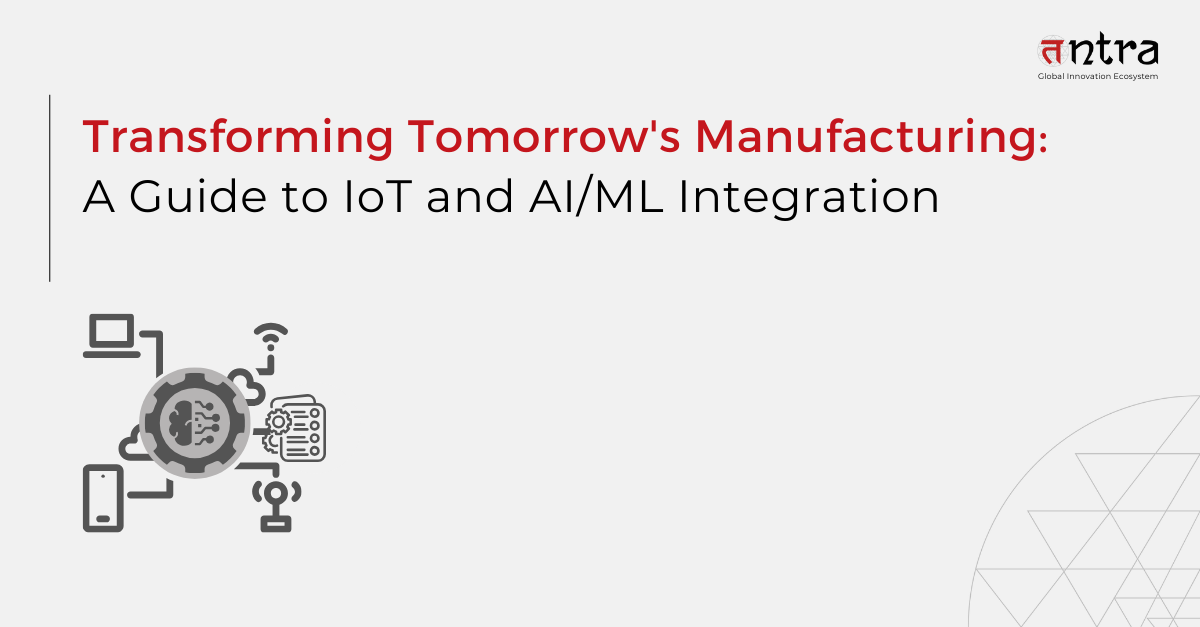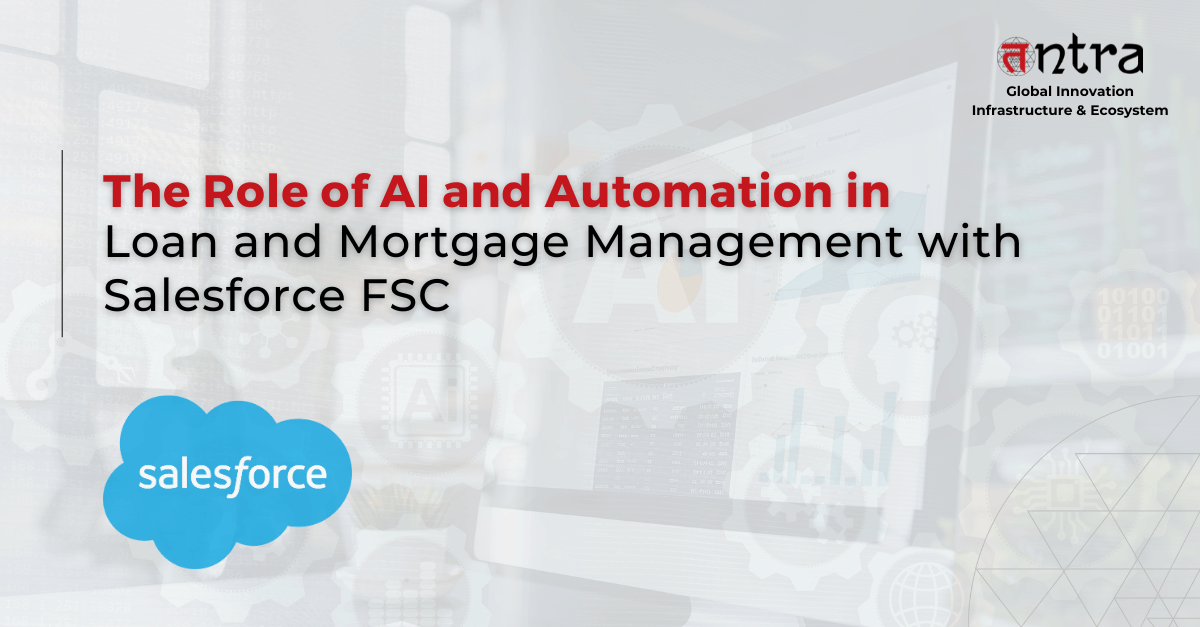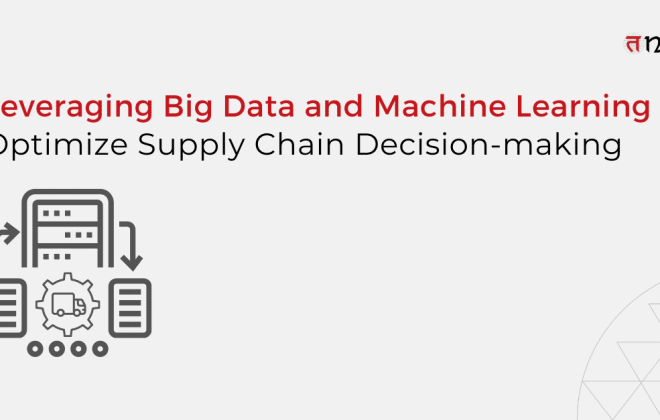
Industry 4.0: Transforming Manufacturing with AI and IoT
Table of Contents
ToggleThe convergence of AI/ML integration and IoT in the manufacturing industry heralds a transformative era within Industry 4.0. As catalysts for enhanced productivity and quality, these technologies redefine manufacturing paradigms. This blog highlights how the symbiosis of AI/ML integration and IoT is revolutionizing Industry 4.0 and reshaping manufacturing norms. It delves into their collaborative impact, from augmenting productivity to redefining quality standards. Read the blog to explore predictive analytics, human-robot collaboration, and other innovative solutions that have transformative potential. Additionally, it underscores generative design and digital twins as game-changers, promising efficiency and an entirely reimagined manufacturing landscape characterized by precision, agility, and pioneering advancements.
The abundance of online content across diverse industry sectors poses a significant challenge in manual sorting and consumption. This process strains human resources and time and often leads to missed opportunities due to inefficiency. Accuracy in categorizing data is lacking, hindering organizational growth. Implementing AI and ML in manufacturing is imperative to streamline this process, ensuring timely access to targeted data for sustained development.
Moreover, identifying articles solely by their titles posed a significant hurdle. Extracting specific data points from these articles proves challenging for the manufacturers. IoT integration and AI/ML in manufacturing have emerged as critical solutions to address these issues, streamlining the process of efficiently accessing and retrieving important information.
Tntra, a software product engineering company, acted as a technical partner of Invenio, providing complete engineering collaboration and support to the company. The platform crawls through the web content to understand sentiments about a company and its news and extract data based on the results generated. The data mining platform offers intelligent text extraction, text analytics, feeds, knowledge graphs, and more about a company’s website.
With the help of artificial intelligence, Invenio is a cloud-based application as a service that helps businesses monitor supplier-related websites. It utilizes Natural Language Processing and Deep Learning algorithms to extract the required information effectively. This platform offers insights into topics, summaries, keywords, sentiments (positive/negative), and other vital content attributes. Moreover, it customizes content based on defined search criteria, serving as a sentiment analysis platform.
Invenio was designed by Tntra to provide information on seven areas of the business: topic classification, sentiment analysis, article summarization, dynamic data extraction, false news identification, and keyword extraction. The idea behind Invenio is to use web-based insights to make informed judgments and streamline the data extraction process. The platform offers financial statistics about the organization, a graph of trending phrases, Google trends, and a subject vs sentiment graph.
Invenio, engineered by Tntra, provides information on seven segments of the business: topic classification, sentiment analysis, article summarization, dynamic data extraction, false news identification, and keyword extraction.
The idea behind Invenio is to use web-based insights to make informed judgments and streamline the data extraction process. The platform offers financial statistics about the organization, a graph of trending phrases, Google trends, and a subject vs sentiment graph.
Invenio applies AI/ML analysis to provide observable benefits by reducing human interaction and errors and expediting thorough data examination. This comprehensive capacity includes sentiment analysis, topic/keyword classification, and web crawling. It focuses on customers’ subjective sentiments in various industries and applications. Processes are automated by this solution, which promotes goal-oriented data and effective decision-making. Through significant time savings, the platform ensures high efficiency by reducing time expenditure. Ultimately, it serves as a decision-making platform by aggregating opinions and enhancing comprehension of target audience sentiments within specific contexts.
Source: EINPresswire
IoT Integration and AI/ML in Manufacturing Operations in Industry 4.0
Industry 4.0 is a growing movement that uses smart technologies to improve production operations. By 2025, this fourth industrial revolution is expected to create $3.7 trillion in value, according to McKinsey. The main component of this progression is the automation of human-managed tasks by AI/ML integration in manufacturing processes. This change is intricately linked to the critical role of the Internet of Things or IoT.
Therefore, more manufacturers are adopting New Economy technologies such as AI, ML, and IoT in their routine operations. AI ML in the manufacturing industry aims to automate complex or repetitive industrial activities by providing cognitive abilities to machines. Cognitive abilities or intelligence are provided to machines by identifying patterns in the manufacturing processes or workflows, which is achieved by gathering enough data and then analyzing it to unearth useful patterns.
The global market for Artificial Intelligence in manufacturing is expected to reach a value of USD 3.2 billion in 2023 and USD 20.8 billion by 2028, growing at a spectacular rate of 45.6% CAGR over the forecast period. Automation technology improvements and the industrial Internet of Things growth are associated with the explosive industry boom.
Surprisingly, 93% of companies recognize AI as the critical technology fostering innovation and growth in the industrial sector. This recognition results from AI’s present solutions to significant industry problems, such as process automation, market trend forecasting, improved quality inspection, and increased product yield. Artificial Intelligence plays a major role in revolutionizing the manufacturing sector.
At the same time, IoT in manufacturing is playing an important role. The IoT in manufacturing industry size was valued at $50.0 billion in 2021 and is poised to generate a revenue of around $87.9 billion by the end of 2026, presenting a CAGR of 11.9% from 2021 to 2026.
How Does IoT Integration and AI/ML in Manufacturing Transform the Production?
Manufacturing is optimized by software product engineering solutions that include IoT, AI, and ML. These innovations have long been essential to industry, increasing productivity and transforming mass production. AI-powered devices that run continuously increase productivity and save operating expenses. IoT collects data in real time, optimizing predictive maintenance and performance. Advanced data analysis prevents problems before they arise, saving downtime and increasing output.
- Quality 4.0
Integrating an IoT platform and AI/ML addresses manufacturers’ global challenge of maintaining consistent product quality amid rising complexity. Employing Industry 4.0 techniques, AI algorithms derived from machine learning enable the production of high-quality goods. Early detection of issues allows immediate resolution, ensuring Quality 4.0 and heightened manufacturing output. Collectively, these technologies serve as a decision-making platform, guiding informed choices to streamline manufacturing efficiency.
- Human and Robot Cooperation
The idea of human-robot cooperation is widely used in industries worldwide that employ millions of robots. Humans are worried that these machines may replace them in their jobs. Robots provide round-the-clock productivity and programmability, while human workers have drawbacks such as shift-based employment. Human responsibilities can be shifted to higher-level work like business process management and programming when robots are integrated into production. Businesses can shift their attention to sales-related tasks and promote sales development and profitability by implementing more robots.
- Predictive Analytics
Maintaining product quality in the face of the growing complexity of products and spare parts is a constant problem for manufacturers. Using AI-driven algorithms created through machine learning, Industry 4.0 approaches provide a solution and make it easier to produce high-quality goods. Early problem detection allows quick fixes, guaranteeing higher output and better product quality.
- Generative Design
Engineers and designers can utilize generative design to explore various system configurations with AI algorithms during the design process. Artificial intelligence and machine learning are employed to test these methods and provide optimal outcomes. Manufacturing companies can quickly create and enhance 3D models by utilizing AI and cloud computing. Machine learning models imitate the engineering design processes, enabling manufacturers to generate multiple design options for specific products swiftly.
- Digital Twins
An Internet of Things (IoT) digital twin uses linked IoT sensors to represent data in real-time, mimicking physical objects like machinery or production processes. Digital twins do many simulations and provide real-time data, unlike simulations restricted to single processes. This cutting-edge solution combines ML/AI with real-time input data for accurate output estimates. This synergy improves R&D and product development with precision and efficiency, supporting smart manufacturing in IoT.
Elevate your operations with Tntra’s IoT-based Anomaly Detection System. Read the case study for innovative solutions that transform industries!
Conclusion
A significant development within Industry 4.0 is leading to AI ML integration in manufacturing along with the adoption of IoT in the manufacturing industry. These developments improve productivity and quality by optimizing industrial processes. AI-enabled gadgets increase productivity and reduce operating costs, and real-time data collecting from the Internet of Things improves performance and maintenance.
IoT and AI/ML integration in manufacturing are fundamental to increased efficiency and flexible operations in the sector, and they will only get better as they grow.
Get in touch with Tntra today to learn how IoT and AI/ML-based digital solutions can revolutionize your manufacturing.





